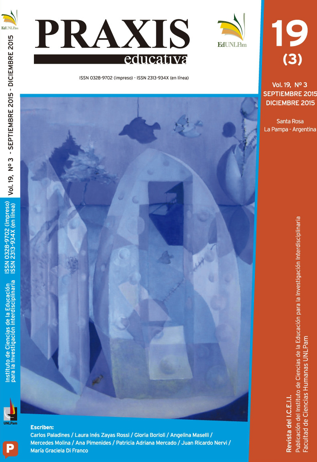The accompanied word. Academic writing in the National University of Córdoba
Keywords:
academic writing, metacognition, framing of the enunciator and enunciation agent, rhetorical abilities, discourse strategiesAbstract
Supported by the evidence found in documents produced by undergraduate and graduate students, the text is focused on representative samples of language practices, autobiography writing, and metacognitive reflections linked with text production from students at the higher education level, analyzed through Carlino (2005), Brito (2010), Natale (2012), Bidiña and Zerillo (2013), Navarro (2013) and others. In general, as an advance conclusion, it can be said that students complain that the intense monotoring carried out by the teaching staff at the beginning of the lerarning process decreases as the course is in progress, but they also show signs of having difficulties in the framing of the enunciator, and their papers manifest scarce rhetorical and pragmatic abilities, in spite of the two decades elapsed since the functional communicative approach for language teaching was officially prescribed in Argentina. Furthermore, students object the lack of common criteria among the teachers regarding the use of academic text formats, and demand institutional agreements or between the faculty members concerning the criteria for the evaluation of papers.
Downloads
Downloads
Published
Issue
Section
License
Copyright Notice
Editorial Committee Educational Praxis Magazine:
I hereby declare that I am the author of the article titled (article name), that it is original and my own and that it was not previously published in any other format or medium. I declare to know that the magazine will not charge me any type of fee under any circumstances, nor will I receive any type of monetary compensation If it were accepted for publication in Educational Praxis, I authorize the aforementioned magazine to publish it digitally and to advertise it on its social networks.
If the work is published, I adhere to the Creative Commons license called "Attribution - Non-Commercial Share Alike CC BY-NC-SA", through which it is allowed to copy, reproduce, distribute, publicly communicate the work and generate derivative works, as long as when the original author is cited and acknowledged. This license has been used since September 2018. In 2016 CC BY NC ND 4.0 was adhered to; and in the years 2017 and 2018 (January-August) CC BY NC 4.0.
This CC BY-NC-SA Share Alike license does not, however, permit commercial use of the work. As an author, the journal may establish additional agreements for the non-exclusive distribution of the version of the work published in the journal, it allows me to self-archive the published articles, in their post-print version, in institutional, thematic repositories, personal web pages or any other relevant use. with the recognition of having been first published in this journal.
Educational Praxis adheres to DORA (Declaration on Research Assessment) signed in San Francisco, California, on December 16, 2012, and to the Declaration of Mexico (Joint Declaration LATINDEX - REDALYC - CLACSO - IBICT).











_(1)2.png)


3.png)











_(2).png)






2.jpg)









